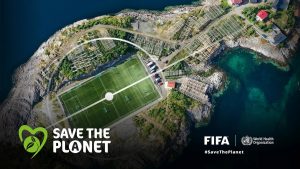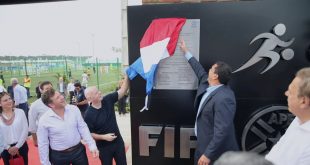 The 2022 FIFA World Cup in Qatar has been a game changer in terms of organising a sustainable tournament. Many innovations will have a lasting influence on the way similar events are planned and delivered in the future.
The 2022 FIFA World Cup in Qatar has been a game changer in terms of organising a sustainable tournament. Many innovations will have a lasting influence on the way similar events are planned and delivered in the future.
We leaned into some of the competition’s most exciting moments, connecting them to game-changing sustainability facets of the tournament.
Messi Wastes No Effort Against Mexico (Efficient Stadium Operations)
After their loss to Saudi Arabia, the next test pitted La Albiceleste against Latin rivals Mexico. The maestro Messi bided his time and conserved his energy. That is, until the 63rd minute when, after receiving an innocent-looking pass from Angel Di Maria just outside the 18-yard box, he pivoted and drove a perfectly placed shot beyond the goalkeeper’s reach, a masterclass in efficiency and precision.
At this year’s FIFA World Cup a comprehensive, dedicated programme has managed stadium energy and water impacts through efficient design, construction and operations. Even Messi would be impressed with these energy-saving measures.
• All stadiums are 30% more energy efficient and consume less water than international benchmarks (ASHRAE 90.1).
• Recycled water vapor from cooling systems in stadiums is used to irrigate the surrounding stadium landscape.
• 90 % of temporary diesel generators were replaced by electric sub-stations providing greener grid power and reducing air pollution.
• All five energy centers at 2022 FIFA World Cup – Qatar stadiums have GSAS Seasonal Energy Efficiency certification.
Future FIFA World Cups will continue to use this sustainability programme as the blueprint for ensuring maximum operational efficiency.
Richarlison’s Electrifying Strike (Electric Transport)
A picture is worth a thousand words, and sometimes, in the case of Brazil’s electrifying forward Richarlison, a million volts of entertainment value.
His dazzling strike against Serbia was worthy of inclusion in the Seleção’s greatest hits. While we’ve yet to figure out a way to harness the high-octane energy of boundless enthusiasm of Brazil’s fans, the widespread use of electric vehicles (EVs) at the tournament in Doha has made a similarly high-charged impact in reducing carbon emissions and safeguarding the environment.
For this edition of the FIFA World Cup, a fleet of 311 eco-friendly hybrid and electric vehicles and 10 electric buses have been provided by sponsors Hyundai and Kia for use as ground transport of teams, officials and VIPs at the 2022 FIFA World Cup – Qatar. This marks the first time that EVs have been deployed in such numbers to service event organisers, a precedent which is sure to be followed as FIFA continues to emphasise the need for clean mobility.
The ecological imperative to avoid, reduce, re-use and recycle has also been a defining policy of the 2022 FIFA World Cup – Qatar from the early planning stages, reflecting the organisers’ leadership and commitment to divert all tournament waste from landfill, including:
• tournament-wide recycling of plastic, aluminum, cardboard, paper and glass and composting of waste food and compostable tableware at all stadiums, training camps, and other official sites.
• all uniforms for workforce staff and 20,000 volunteers were made from recycled materials, and distributed in bags converted from signage and stadium dressing from previous events.
• Local charity Hifz Alnaema redistributed leftover food from stadiums and events to people in need.
Moroccan history-makers (Accessibility)
Prior to Qatar 2022, no African or Arab nation had ever gone beyond the quarter finals of a FIFA World Cup. Morocco’s magnificent run to the semifinals has now changed that.
Inclusivity has been a game-changer in terms of inclusivity, thanks to an expansive range of features which have helped make it more accessible for disabled fans:
• Mobility assistance, accessible transport, parking, facilities and five ticket types for disabled people and people with limited mobility.
• Audio-descriptive commentary in English, and for the first time Arabic, for blind and partially sighted people to enjoy matches in the live stadium atmosphere.
• For the first time at a FIFA World Cup, sensory rooms for people with sensory access requirements to allow them to attend a match without becoming overwhelmed by the sounds and stimuli of match day.
 Arunava about Football A look at football & the world through my eyes!
Arunava about Football A look at football & the world through my eyes!



